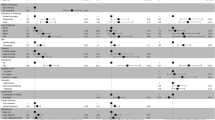Abstract
Purpose
The frequency and types of breast symptoms reported by women in the National Breast and Cervical Cancer Early Detection Program (NBCCEDP) have never been characterized. This study aims to establish the frequency of reported symptoms and the diagnostic outcomes associated with reported symptoms.
Methods
We examined the frequency of symptoms reported prior to mammography using medical record abstraction data from women in the NBCCEDP. We also calculated adjusted odds ratios (aOR) of having an abnormal mammogram, an abnormal clinical breast examination, or a final diagnosis of breast cancer by symptoms, compared to asymptomatic women.
Results
In our sample of women, 10.3 % reported at least one symptom. Women with symptoms were younger and more likely to be non-Hispanic white. Among those reporting symptoms, breast lump (31.7 %) and pain or tenderness (49.3 %) was most common. A relatively low proportion of women with symptoms were diagnosed with in situ (0.9 %) or invasive breast cancer (4.3 %). However, a self-reported breast lump [aOR 13.7; 95 % confidence interval (CI) 7.8–24.1], inflammation or changes to the skin/nipple (aOR 27.8; 95 % CI 8.7–88.8), and other or unspecified symptoms (aOR 3.4; 95 % CI 2.1–7.5) were associated with an increased risk of invasive breast cancer.
Conclusions
Although the prevalence of breast cancer among women reporting symptoms is relatively low, knowing which symptoms carry the highest breast cancer risk is important to assist in appropriate diagnostic workup.

Similar content being viewed by others
References
U.S. Cancer Statistics Working Group (2013) United States Cancer Statistics: 1999–2010 Mortality, WONDER Online Database. United States Department of Health and Human Services, Centers for Disease Control and Prevention
Barlow WE, Lehman CD, Zheng Y et al (2002) Performance of diagnostic mammography for women with signs or symptoms of breast cancer. J Natl Cancer Inst 94:1151–1159
Barton MB, Elmore JG, Fletcher SW (1999) Breast symptoms among women enrolled in a health maintenance organization: frequency, evaluation, and outcome. Ann Intern Med 130:651–657
Geller BM, Barlow WE, Ballard-Barbash R et al (2002) Use of the American College of Radiology BI-RADS to report on the mammographic evaluation of women with signs and symptoms of breast disease. Radiology 222:536–542
Salzman B, Fleegle S, Tully AS (2012) Common breast problems. Am Fam Physician 86:343–349
Kosir MA, Chism L, Bland K, Choi L, Gorski D, Simon MS (2013) Common breast symptoms: when to refer to a breast surgeon. Adv NPs PAs 4:12–15
Aiello EJ, Buist DS, White E, Seger D, Taplin SH (2004) Rate of breast cancer diagnoses among postmenopausal women with self-reported breast symptoms. J Am Board Fam Pract 17:408–415
Ryerson AB, Benard VB, Major AC (2005) The National Breast and Cervical Cancer Early Detection Program 1991–2001 National Report. Department of Health and Human Services, Atlanta
Miller JW, Hanson V, Johnson GD, Royalty JE, Richardson LC (2014) From cancer screening to treatment: service delivery and referral in the National Breast and Cervical Cancer Early Detection Program. Cancer 120:2549–2556. doi:10.1002/cncr.28823
Ekwueme DU, Subramanian S, Trogdon JG et al (2014) Cost of services provided by the National Breast and Cervical Cancer Early Detection Program. Cancer 120:2604–2611. doi:10.1002/cncr.28816
Yancy B, Royalty JE, Marroulis S, Mattingly C, Benard VB, DeGroff A (2014) Using data to effectively manage a national screening program. Cancer 120:2575–2583. doi:10.1002/cncr.28821
Williams RS, Brook D, Monypenny IJ, Gower-Thomas K (2002) The relevance of reported symptoms in a breast screening programme. Clin Radiol 57:725–729
Eheman CR, Leadbetter S, Benard VB et al (2014) National Breast and Cervical Cancer Early Detection Program data validation project. Cancer 120:2597–2603. doi:10.1002/cncr.28825
D’Orsi CJ, Mendelson EB, Ikeda DM (2003) Breast Imaging Reporting and Data System: ACR BI-RADS—Breast Imaging Atlas. American College of Radiology, Reston
Inc. SI (2011) Base SAS 9.3 utilities: reference. SAS Institute Inc, Cary
Eberl MM, Phillips RL Jr, Lamberts H, Okkes I, Mahoney MC (2008) Characterizing breast symptoms in family practice. Ann Fam Med 6:528–533
Dushkin H, Cristofanilli M (2011) Inflammatory breast cancer. J Natl Compr Cancer Netw 9:233–240
Foulkes RE, Heard G, Boyce T, Skyrme R, Holland PA, Gateley CA (2011) Duct excision is still necessary to rule out breast cancer in patients presenting with spontaneous bloodstained nipple discharge. Int J Breast Cancer 2011:495315
Network NCC. Breast Cancer (Version 2.2014)
Gail MH, Brinton LA, Byar DP et al (1989) Projecting individualized probabilities of developing breast cancer for white females who are being examined annually. J Natl Cancer Inst 81:1879–1886
Singh D, Malila N, Pokhrel A, Anttila A (2015) Association of symptoms and breast cancer in population-based mammography screening in Finland. Int J Cancer 136:E630–E637. doi:10.1002/ijc.29170
Galvin R, Joyce D, Downey E, Boland F, Fahey T, Hill AK (2014) Development and validation of a clinical prediction rule to identify suspected breast cancer: a prospective cohort study. BMC Cancer 14:743. doi:10.1186/471-2407-14-743
Devolli-Disha E, Manxhuka-Kerliu S, Ymeri H, Kutllovci A (2009) Comparative accuracy of mammography and ultrasound in women with breast symptoms according to age and breast density. Bosn J Basic Med Sci 9:131–136
McCowan C, Donnan PT, Dewar J, Thompson A, Fahey T (2011) Identifying suspected breast cancer: development and validation of a clinical prediction rule. Br J Gen Pract 61:e205–e214. doi:10.3399/bjgp11X572391
Conflict of interest
The authors declare that they have no conflict of interest.
Author information
Authors and Affiliations
Corresponding author
Additional information
The findings and conclusions in this report are those of the authors and do not necessarily represent the official position of the Centers for Disease Control and Prevention.
Rights and permissions
About this article
Cite this article
Ryerson, A.B., Miller, J. & Eheman, C.R. Reported breast symptoms in the National Breast and Cervical Cancer Early Detection Program. Cancer Causes Control 26, 733–740 (2015). https://doi.org/10.1007/s10552-015-0544-1
Received:
Accepted:
Published:
Issue Date:
DOI: https://doi.org/10.1007/s10552-015-0544-1




